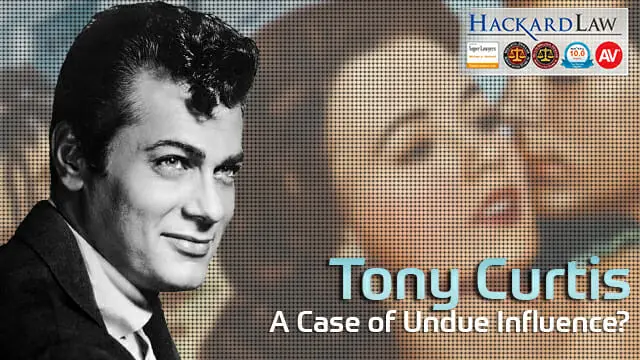
Tony Curtis | Estates, Stepmothers & Undue Influence
Tony Curtis was a Hollywood icon, an actor who appeared in more than 100 films, a World War II veteran who served honorably in the Navy aboard a submarine, and an actor who was nominated for two Golden Globes, one Emmy and one Oscar. He was a major star who acted alongside Frank Sinatra, Cary Grant, Jack Lemmon, and Kirk Douglas. He also starred with Marilyn Monroe in their hit 1959 comedy “Some Like It Hot.”
Despite his enormous success, his death was hastened by years of cigarette smoking, alcoholism, and cocaine addiction. When Curtis died in 2010 at the age of 85, he left behind a rich film legacy, 6 wives, 5 children, and 7 grandchildren. In a surprise to them, however, he left behind only one heir who inherited his $40 Million estate – his 6th wife, Jill Vandenberg, who was 45 years his junior.
To make matters worse, a year after Curtis died, his widow sold hundreds of personal effects and memorabilia at an auction that netted more than $1 Million. None of his children, including the actresses Jamie Lee Curtis and Allegra Curtis, received any of the proceeds. Why? Because a year before he died, Curtis wrote a new will and re-did his Trust which effectively disinherited all his children.
The Curtis case, like many other celebrity elder financial abuse cases, springs from a less than amicable relationship between the widowed stepmother and her stepchildren. Of course, it likely didn’t help that Curtis’ widow was considerably younger than all her stepchildren.
For someone in his mid-80’s and not in good health to suddenly change his will and trust to actively disinherit children, is an uncommon event. In my legal experience, such late changes to an estate, especially ones involving stepmothers and stepchildren, nearly always lead to litigation. When his shocked children received the news, the initial reaction was predictable. There were public charges of “duress, menace, fraud and undue influence.”
From multiple press reports in the months following his death, we also learned that the relationship between Curtis and his children was strained. Perhaps they didn’t get along. Perhaps he felt that they were all financially self-sufficient and therefore did not need to inherit any of his wealth. Perhaps he wanted to make a public statement.
Or perhaps, as his children first alleged, he was not thinking clearly as his health declined, and he was not mentally capable of understanding the implications of his actions.
The prose from his will, however, was clear enough: He wrote: ‘I acknowledge the existence of my children . . . and have intentionally and with full knowledge chosen not to provide for them in this last will and testament.’
In the end, Curtis’ children quickly dropped the suit against their stepmother and brought the matter to a close. Since most of them were actors and public figures, perhaps they believed that continuing with a lawsuit would cause reputational damage. Maybe they did not, after all, need the money.
Of course, the entire public spectacle caused by Tony Curtis disinheriting his children could have been easily avoided. Any good estate attorney could have drafted legal documents that would have kept the entire matter private, and might also have maintained a more stable relationship between the widowed stepmother and her stepchildren. Litigation is always a last resort, and there is no compelling reason why the Tony Curtis estate should have ended up in Court. For people with complicated family lives and significant estates, be they celebrities or not, the lesson is clear: get the parties talking long before the end comes.
As I wrote in a blog post about the Curtis case in 2014, “don’t be tempted to think the stars are better off than us in any essential way – fame and fortune only seem to magnify the misery of a family feud.”

 (916) 775-8542
(916) 775-8542